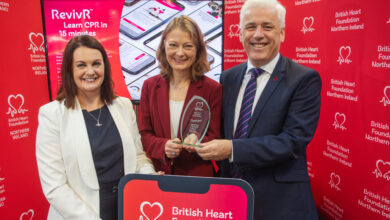Focus on antibiotics


On his 10th year as Chief Medical Officer for the Department of Health Michael McBride writes for agendaNi about his annual report with a focus on the growing, global problem of antimicrobial resistance.
Antimicrobial resistance (AMR) occurs when the micro-organisms (such as bacteria) that cause infection survive exposure to a medicine (such as an antibiotic) that would normally kill them or stop their growth.
AMR is not a new phenomenon. In fact, penicillin’s discoverer, Sir Alexander Fleming, warned of the possibility of a post-antibiotic era during his Nobel prize acceptance speech.
Today, the World Health Organization recognises AMR as one of the greatest threats to human health and to human medicine worldwide. The issue has also been addressed by the General Assembly of the United Nations who, in September 2016, dedicated a meeting to the subject – only the fourth time in its 70-year history that a General Assembly meeting was given over to a health topic (the other three topics previously discussed were HIV, Ebola and non-communicable diseases).
Across the UK, work has been ongoing for a number of years to try to reduce the growing problem of AMR but a significant step was taken in 2014 when the then Prime Minister, David Cameron, asked economist, Lord Jim O’Neill, to analyse the problem and to recommend concrete steps to tackling it.
Lord O’Neill published the final report in 2016 and gave stark warning that, if the problem is not tackled now, by 2050, drug resistant infections could kill 10 million people globally every year rising from current estimates of 700,000 – more than currently die from cancer.
In response to the review, David Cameron said: “If we fail to act, we are looking at an almost unthinkable scenario where antibiotics no longer work and we are cast back into the dark ages of medicine.”
The stark truth is that in Northern Ireland we prescribe significantly more antibiotics than in anywhere else in the UK – in 2016, 1.9 million individual prescriptions were issued in primary care which equates to about one course of antibiotics for each person in the population during that year. By comparison, in England for the same period the prescribing level for primary care was 0.7 antibiotic prescriptions for each person in the population, or approximately 30 per cent less than Northern Ireland.
Although the majority of antibiotics are prescribed by GPs, around 8 per cent of antibiotics used in primary care in Northern Ireland are prescribed by dentists.
The good news is that there has been a general reduction in the prescribing of antibiotics in primary care over the past 10 years, with a 10 per cent reduction across Northern Ireland. This has been achieved by initiatives such as the introduction of ‘Antibiotic Champions’ – in 2016/17 over half of GP practices signed up a named Antibiotic Champion in their practice and produced an antibiotic action plan. In addition, a number of GP practices have been selected to trial new tests which can be used in the practice to help differentiate between bacterial and viral infections. These involve a simple finger-tip blood test and can help the doctor decide whether an antibiotic is really necessary. If the pilot is successful, we can look to rolling it out to other practices across Northern Ireland.
As well as GPs, nurse prescribers and dentists, pharmacists have a role to play in antibiotic prescribing and supply. Modern pharmacists’ roles involve prescribing, medication reviews, advising medical and nursing staff and patients on the safe and appropriate use of medicines, as well as supplying medicines. In 2016, the Chief Pharmaceutical Officer worked with me to produce the Northern Ireland Medicines Optimisation Quality Framework, which makes recommendations to promote safer and more appropriate use of medicines, including antibiotics, for better patient outcomes.
I am greatly encouraged by the steps that doctors, pharmacists and dentists are taking as their contribution is imperative if we’re to reduce antibiotic resistance.
But we can’t simply look to practitioners and professionals to make changes. AMR is a problem for all of us and we all have a role to play in addressing it.
The single most important thing we can all do is to practice good hand hygiene. The simple act of washing our hands can help protect us and our families from infections that may require antibiotics.
Also remember that antibiotics don’t work on viruses so, if you have a cold or flu, look after yourself with plenty of rest, fluids and over-the-counter remedies. Of course, if your symptoms persist for longer than normal or you have a long-term medical condition or immune deficiency, you should take advice from your pharmacist or doctor.
Finally, if you are prescribed antibiotics, remember that your doctor is the best person to provide advice on the dose and length of the treatment so you should always finish the antibiotics given to you, even if you start to feel better. You can also sign up to becoming an Antibiotic Guardian at their website: http://antibioticguardian.com where you can also find lots more information about AMR aimed at both adults and children.
I should also say that I recognise that AMR is not just a problem that needs to be addressed through human health, it’s an issue that extends to agriculture and veterinary practices where antibiotics are used to control animal infections. These antibiotics can then work their way into the food chain and indeed into the environment for example through animal waste.
Recently, I along with my colleagues Robert Huey, the Chief Veterinary Officer, and Maria Jennings, the Director of the Food Standards Agency in Northern Ireland, hosted a one-day event to focus on AMR and to start thinking about tackling it with a ‘One Health’ approach, that is, recognising that humans, animals, food and the environment are all inter-linked and that no one sector can tackle this issue in isolation. The event had buy-in from participants from a wide range of backgrounds including government, academia and industry. I am greatly encouraged by the support we had on the day and the commitment from those at the conference to work together over the coming months and years to identify actions and practical solutions.
Healthy lifestyles
In my annual report I address many other lifestyle issues which I see as major threats to public health. For example, we’re still drinking too much alcohol. In Northern Ireland, over two-thirds of adults drink alcohol and around 250 people die every year from alcohol-related causes. In addition, there are over 12,000 alcohol-related admissions to hospital and eight out of 10 Emergency Department attendances are alcohol-related at peak times during the weekend.
I, and the other Chief Medical Officers across the UK, published new ‘low risk’ guidelines in 2016. These recommend that both men and women drink less than 14 units of alcohol a week – that equates to six pints of 4 per cent beer or six glasses (187.5ml) of 12 per cent wine. It is important to realise that these are guidelines, not a target as recent evidence has shown that any alcohol consumption can cause certain cancers. You are safest not to drink regularly more than 14 units per week and if you do drink as much as 14 units per week, spread this over three days or more. And if you are pregnant or planning a pregnancy, the safest approach is not to drink alcohol at all.
Also of great concern to me are the current levels of obesity in Northern Ireland, with 60 per cent of adults and 21 per cent of children aged two to 15 years overweight or obese in 2015/16. We also have a worrying rise in cases of diabetes. An important contributing factor is that adults are eating twice as much sugar as recommended and children three times more than they should. My report contains helpful information on sources of sugar for 11-18 year olds and recommends that free or added sugars make up no more than 5 per cent of daily calorie intake from food and drink. My report also recommends that you:
- check sugar content and choose lower sugar foods and drinks;
- think about portion sizes; and
- watch out for calories in beer, wine and other alcoholic drinks.
Of course, while many of us are aware of the health risks when they’re very obvious and immediate, we sometimes don’t think about wider environmental issues such as air pollution. The truth is that poor air quality affects everyone. It can trigger asthma and increase symptoms in those with heart and lung disease and it can have other long-term impacts on health including an increased risk of lung cancer. Air pollution has a disproportionate impact on younger and older people and those with pre-existing illness, while people living in more deprived communities are more likely to be near sources of air pollution such as busy roads and are more likely to experience poor health.
There are however a range of actions we can all take to reduce air pollution such as:
- try alternatives to using the car such as walking, cycling or taking the bus;
- avoid burning solid fuels particularly smoky coal or unseasoned wood, think about air pollution before you light a bonfire; and
- ensure heating appliances are properly installed, serviced and in good repair. This will also help to protect you from the risk of carbon monoxide poisoning.
In addition, my report contains articles on vitamin D, mental health, breastfeeding and the dangers of misusing prescription drugs.
You can access my report at https://www.health-ni.gov.uk/publications/chief-medical-officer-annual-reports





